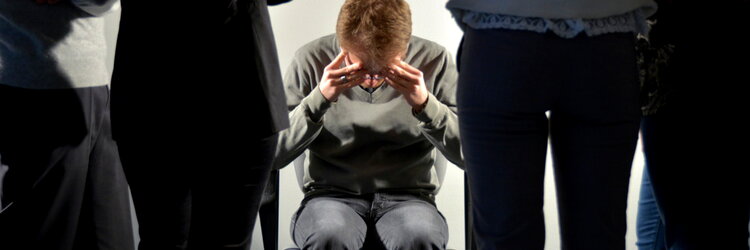
2 Answers
Leave a Reply
You must Register - Login to add an answer.
11 Answers
According to the logotherapy concept of a person, conscience is a spiritual property of a person, a compass pointing to universal values, such as love, justice, kindness, life, etc. Conscience refers to specifically human phenomena. It can be defined as the intuitive ability to feel the meaning that is hidden in each situation. Thus, the conscience is an organ of meaning.
The ability of a properly educated person to comprehend some of their actions as bad or harmful to someone or something, as well as a sense of shame and regret from what they did.
Conscience — the ability to evaluate your personal actions from the position of”good-bad”for others.
For example, when I have made someone happier by my actions, I feel that I have done “well”.�When I have protected my own interests by my actions without harming the other person, I feel that I have acted “neutrally”.When I've done something nice to myself but hurt someone else, I feel like I've done something “bad.”
Your conscience tells you how much you are doing right and justly in relation to other people.
There is an assumption that this is a system of measures of behavior and way of thinking imposed by society, which subconsciously makes itself felt every time a person makes a particular choice.
There is another assumption, according to which conscience is the voice of God inside each person.
There is no universal answer, since this is a metaphysical concept. So it's up to you to decide which one is more correct
Conscience for better understanding, it is better to write a conscience is a set of internal rules created in a person by parents, society, place of residence, culture, history, customs, external governance, including unwritten laws, i.e. spiritual laws.
But here is what Conscience is, based on the understanding of it by the Monk Abba Dorotheus:
“When God created man, He instilled in him something divine, as it were, a certain thought that has in itself, like a spark, both light and warmth; a thought that enlightens the mind and shows it what is good and what is evil. This is called conscience, and it is a natural law.
The preservation of conscience is diverse, for a person must preserve it in relation to God, to his neighbor, and to things.
He acts according to his conscience in relation to God who does not neglect His commandments, even in what people do not see and what no one demands of us; he listens to his conscience to God in secret. For example, if a person was lazy in prayer or a passionate thought entered his heart, and he did not resist it and did not restrain himself, but accepted this thought; also, if someone, seeing his neighbor, as usually happens, condemned him-in short, all the evil that happens in secret, which no one knows except God and our conscience, we must recognize as sin and repent; and this is
Keeping one's conscience in relation to one's neighbor requires one not to do anything that, as we know, offends or seduces one's neighbor, by deed or word, by sight or look: for even by sight, as I often repeat, even by looking, one can offend one's brother.
Keeping one's conscience in relation to things consists in not treating any thing carelessly, not allowing it to deteriorate, and not throwing it away in any way, and if we see something thrown, we should not neglect it, even if it is insignificant, but pick it up and put it in its place. It is the same in food: a person can satisfy his need with a small amount of vegetables, and he does not want this, but he is looking for other food, tastier and better-this is all against conscience.”
In the structure of the psyche, there is such an instance as the super-ego. In Russian, conscience. Morality and morality are concepts of the same plane. In the process of individual development, each child learns to distinguish between ” what is good and what is bad.” It is the task of parents to teach the child an idea of this. Until a certain age, children are afraid only of parental punishment, and then parental voices begin to “sound” in their heads even when their parents are not around. This is how the super-ego is formed.�
From Ivan's answer, I realized that the awareness of good/bad is already a conscience. But what if a person, for example, consciously acts “badly”?It's hard to blame him for having a conscience. It seems to me that conscience is the fear of being judged by society (or being rejected/misunderstood). And as a rule, conscience works until conviction. But when the judgment takes place, shame comes into force.
Conscience is the inner parent who is always with us. Such an inner mom, if you will. And mom is always important, so it's so hard to fight with your conscience!
My teacher recently quoted a scholar as saying that ” conscience is memory.”
140 characters 140 characters�140 characters 140 characters 140 characters
Conscience is an internal mechanism by which a person evaluates his actions, words, feelings, and anything else, such an internal judge.
We can say that conscience is the Super-Ego (super-Ego) behind Froyd's theory, that is, a kind of moral censor that independently determines the activity of its owner in the categories of “good” and “bad”, as a result of which punishment or guilt, or satisfaction with one's actions, approval, may follow.
Is conscience imposed by social norms, social morals, and upbringing, or is it still an individual mechanism of responsibility? And I would like to say that this is not such a significant aspect, since conscience is formed from childhood, yes, of course, education and the influence of the outside world play an important role here, but a person independently determines for himself what is acceptable for him, and what is taboo, what is good and what is bad. Conscience is somewhere in the middle in the coordinate system between generally accepted morality and personal morality, here everyone has it individually.
Conscience can also be associated or even identified with responsibility, although this is not entirely correct, since conscience is a more extensive concept. Depending on whether we take responsibility for our actions or not, the verdict of conscience also depends.
I would also like to add that it is worth evaluating your actions, actions, that is, “I'm doing something bad”, and not “I'm bad”.
“Your conscience is the measure of the sincerity of your desire to be yourself”
Richard Bach (Illusions)�
140 characters 140 characters 140 characters 140 characters 140 characters
Leave a Reply
You must Register - Login to add an answer.

For me, this is a test of plans and actions for compliance with my values, and the deepest values – meanings.
This is exactly about me, because someone said prohibitions and ay-ya-yay, – these are THEIR cockroaches; thank you, I have enough of my own.
But what is important and valuable for me, as I am, of course there is. However, I do not perceive “conscience” as something separate. This is part of my decision-making considerations, part of how my choices respond: what I want more.
Such splitting that strongly wanted something, and conscience screamed and forbade, there is no long time ago. Somehow I'm not that lean-flat-prude in this regard, I'm not, I just somehow make friends with myself and respect myself))
And for others, conscience is their own.
The human conscience is the only correct and eternal strict judge. Human conscience, HAVING A DIVINE ORIGIN, has given all mankind the rules of a just life. But people have become unscrupulous in their lives, creating rudeness and permissiveness out of their conscience.
Amen.